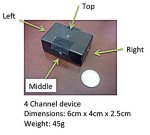U.S. Navy scientists have developed a new low-cost solar monitoring device that they say will assist in improving the efficiency of solar panels used in field equipment by military forces on active duty.
The device, a spectral radiometer, is used to measure the amount of solar radiation – sunlight – that strikes a solar cell. Previous incarnations required specialised beam refraction components and expensive moving parts, but researchers from the U.S. Naval Research Laboratory (NRL) have created an individual system which costs less than $20 to manufacture.
“We have invented a novel minimum size, ultra-low power spectral radiometer unit with integrated data storage functionality and a battery lifetime of up to several years,” said Dr. R. Hoheisel, NRL Solid State Devices Section. “In addition, the system can be produced at the expense of under $20 and features very high sensitivity and linearity.”
Put simply – what the Navy’s latest solar monitor will do is enable better calibration of solar power systems used by Marines in the field, along with measuring solar levels in areas of operations; helping to design the mobile solar power units of the future.
“A challenge to research of long-term expeditionary devices was we had no information regarding when, and how long, mobile solar power units were in the sun,” Hoheisel said. “These units have a dynamic range of 0.01 – 2 suns measured in 30-second intervals, a data capacity of 128 megabytes (MB), an average power consumption of 100 microwatts (uW) and an independent real time clock.”
The Navy has recognised that by employing renewable energy systems on the battlefield fuel consumption, per Marine, can be cut by 50 percent. These mobile solar power units, including flexible photovoltaic blankets, solar powered drones, trailer-based hybrid generators and underwater sensors are lightweight, portable and allow field personnel to operate independent of traditional supply lines.
Thanks to its diminutive size, long battery life and the ability to measure various light intensities and wavelengths, Hoheisel says results from the new solar sensor will lead to improved portable solar devices.
Source












































